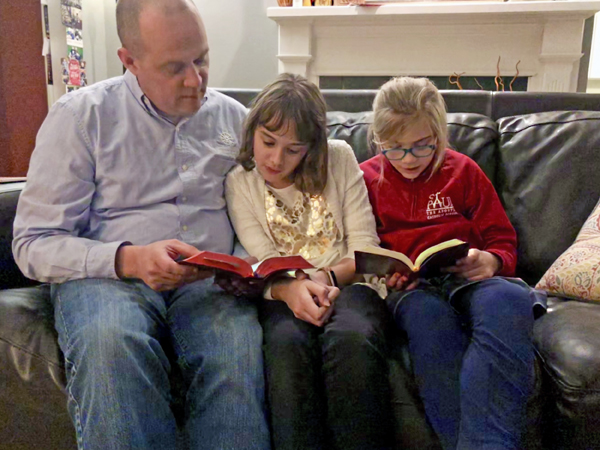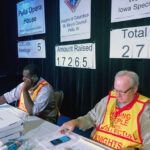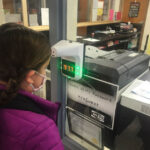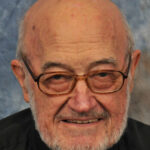By Barb Arland-Fye
The Catholic Messenger
God’s people have been praying the psalms for millennia, praising, thanking and beseeching their Creator. Early Christians, following in the footsteps of the Jewish people, embraced what has come to be known as the Liturgy of the Hours (LOH), consecrating “to God the whole cycle of day and night” (Christian Prayer: the Liturgy of the Hours).

Ryan Burchett and his daughters pray The Liturgy of the Hours.
Some 50 years ago, the Second Vatican Council chose to restore the Liturgy of the Hours so that clergy and laypeople might celebrate it better. Pope Paul VI approved the restoration on Nov. 1, 1970. “This daily prayer of the psalms, with its added hymns, readings, and invocations, belongs to the Church’s liturgy — her official, public prayer,” observes Father Timothy Gallagher, O.M.V. in his book “Praying the Liturgy of the Hours.” He says the LOH is “the Church’s greatest gift to hearts that long for prayerful communion with God throughout the day.”
Priests are required to pray the full Liturgy of the Hours; deacons are required to pray the two major hours — Morning and Evening Prayer. Religious communities vary in their praying of the Hours, depending on their particular charism. But the LOH is not intended as a prayer for the clergy and religious alone. All the faithful are encouraged to pray the LOH to enter more deeply into the life of the church.
A deacon aspirant’s view
Ryan Burchett of St. Paul the Apostle Parish in Davenport began praying the Liturgy of the Hours regularly this past summer as a member of Class VIII, discerning a call to the diaconate in the Davenport Diocese. The business owner, husband and father of young children, appreciates this form of prayer for many reasons.
“I like the structure it gives me. Sometimes our prayer life can get stagnant or stale and we find it hard to pray. The Liturgy of the Hours has the words there for you when maybe you don’t have the right words to say. I also love the thought of praying the psalms as Jesus would have. The unity of the whole church praying those words together brings gravity to the prayer that I think few of us fail to fully realize.”
Burchett prays the LOH alone or with his wife, Monica, with his diaconate classmates and with Father Bill Kneemiller, who has a passion for spreading the word about the LOH. Usually, Burchett prays at home in the morning and evening with Monica. “It’s that quiet time before the kids get up and after they go to sleep at night. It’s not exactly the prescribed hours, but as parents of little ones, we take the time we can find!”
The LOH “has definitely become a community builder for our diaconate class,” Burchett said. “We begin each class with Morning Prayer and end with Evening Prayer. We are learning together and praying together. It is a wonderful form of community prayer. That’s why it is called the ‘Liturgy’ of the Hours. It’s the prayerful work of the community together. I would encourage others to try it with their faith communities. It would be a great Lenten effort.”
Asked about the challenges of learning to pray the LOH, Burchett said, “At first, it can be intimidating. Learning the process of when to say what can keep your mind worrying more about process than prayer. That can make it a fairly dry experience to start. But keep at it. Remember, you are praying as the church. Over time you will begin to realize the psalms can penetrate your heart in all kinds of ways.”
A deacon wife’s view
“Praying the LOH brings a calming effect to the part of the day in which we say it,” reflects LuAnn Glaser, the wife of Deacon Bob Glaser. They are members of Divine Mercy Parish in Des Moines County. “The LOH draws us into the beauty of the Scriptures and particularly the beauty of the psalms.”
She and her husband “pray the LOH everywhere we can: in the car when we are traveling, every night as part of our evening routine of writing a love letter to each other and praying before we go to bed, in church during Adoration, with the parish’s men’s prayer group one evening per week; with parishioners after Mass on Friday mornings.” When they travel with their adult children, “we expose them to it and they can join us.”
The Glasers didn’t experience challenges learning to pray the LOH. “We were able to get into the pattern easily. When we first began praying LOH, time could be a challenge.”
So why should all of us pray it? “The LOH brings us all together as a church, as the body of Christ. We are praying the same prayers around the world.”
A bishop’s view
When a bishop prays the Liturgy of the Hours, it is always in the name of the Catholic Church and on behalf of the church entrusted to him. (Christian Prayer: the Liturgy of the Hours).
“For me and for the Church, the Liturgy of the Hours (LOH) sanctifies the day and the activities in which we engage during the day,” Bishop Thomas Zinkula said. “Even when someone prays it alone, which I usually do, it is public, liturgical prayer, not personal, private prayer. It is the prayer of the Church, by the Church and for the Church.
“It is centered on praying the psalms, which should open our hearts to the different attitudes they express (grief, trust, gratitude, etc.). When I pray a psalm in the LOH, if I can’t relate to the feeling of the psalm at that particular moment in my life, I think of and pray for someone to whom it does relate – Jesus at some point in his earthly life, the Church, the diocese, a person I know, a group of people somewhere in the world.”
Resources on the Liturgy of the Hours
“Christian Prayer: The Liturgy of the Hours,” Catholic Book Publishing Corp., N.Y., 1976
“Shorter Christian Prayer, Catholic Book Publishing Corp., N.Y., 1988
“Praying the Liturgy of the Hours: A Personal Journey,” by Timothy M. Gallagher, O.M.V., The Crossroad Publishing Company (www.crossroadpublishing.com), 2014
“Praying the Psalms in the Liturgy of the Hours,” by Richard Atherton, Ligouri Publications, (www.ligouri.org), 2004.











